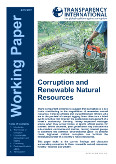Focal point
Location
The Food and Agriculture Organization of the United Nations leads international efforts to defeat hunger. Serving both developed and developing countries, FAO acts as a neutral forum where all nations meet as equals to negotiate agreements and debate policy. FAO is also a source of knowledge and information. We help developing countries and countries in transition modernize and improve agriculture, forestry and fisheries practices and ensure good nutrition for all. Since our founding in 1945, we have focused special attention on developing rural areas, home to 70 percent of the world's poor and hungry people.
Members:
Resources
Displaying 3161 - 3165 of 5074Adaptation to climate change in agriculture, forestry and fisheries: perspective, framework and priorities
Climate change poses severe threats on agriculture. Even though some countries may experience beneficial change to agricultural gross domestic product (GDP), the majority, particularly developing countries, will experience significant negative impacts. This paper by the Food and Agriculture Organisation of the United Nations (FAO) promotes an integrative, holistic framework for climate change adaptation. It presents the potential impacts of climate change and the different approaches to adaptation, as well as knowledge gained through FAO's experience in the field.
WORKING PAPER 01/2007: CORRUPTION AND RENEWABLE NATURAL RESOURCES
There is important evidence to suggest that corruption is a key factor contributing to the degradation of renewable natural resources. Forestry officials and law enforcement officers who are in the pockets of corrupt logging firms often turn a blind eye to activities that threaten the sustainable management of a forest’s biodiversity. Similarly, fishery inspectors endanger stocks when they accept bribes to ignore official quotas for trawlers.
The Scheduled Tribes and Other Traditional Forest Dwellers (Recognition of Forest Rights) Act
"An Act to recognise and vest the forest rights and occupation in forest land in forestdw~ing Scheduled Tribes and other traditional forest dwellers who have been residing in such forests for generations but whose rights could not be recorded; to provide for a framework for recording the forest rights so vested and the nature of evidence required for such recognition and vesting in respect of forest land"
Rethinking agricultural reform in Ukraine
Land reform: Land settlement and cooperatives
This issue of Land Reform, Land Settlement and Cooperatives offers the reader a series of articles and information and examones the importance of land tenure data and databases and their roles in their host societies. The volume represents rich set of articles specific for many regions and countries. The data presented is crucial for decison and policy making inthe fields of economic development, food security and environmental sustainability,









